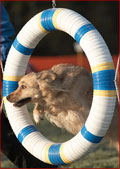Cold Weather Protection for Pets
Following are timely tips to protect pets in cold weather:
Before, during and after walks and outdoor exercise:
* Coats and booties can help your dog stay warm. In particular, short-haired or elderly dogs benefit from wearing a coat or sweater. Look for coats or sweaters with high collars or a turtleneck that covers the dog from the base of the tail on top to the belly underneath.
* Remember to be very careful with sick or older dogs, since they are more sensitive to cold weather. For any dog sensitive to the cold due to age, illness or breed type, take him outdoors only to relieve himself.
* Puppies do not tolerate the cold as well as adult dogs and may be difficult to housebreak during the winter. If necessary, papertrain your puppy inside if he appears to be sensitive to the weather.
* Clip the fur between toe pads to reduce the amount of snow that collects between toes.
* To help protect dry, sensitive paws, try coating them with a bit of cooking spray before walks in very cold weather.
* During deep snows, shovel out a potty spot for your dog.
* Upon returning home, wipe snow and ice off your dog's feet, legs and belly. Little ice cubes can form in the sensitive spaces between the toes and toe-pads. Remove the ice carefully with your fingers since it may cling to the hairs between the paws. Wiping off your dog will remove any salt, antifreeze or other harmful chemicals that she could ingest them when licking her paws.
* Consider keeping a container of warm water and cloths by the door for use after walks. It is good to rinse the paws before you wipe them dry, because lime rock salt and calcium chloride salt can irritate the foot pads and cause vomiting and diarrhea when licked. Dunking in the water will also dissolve ice and remove mud.
* Many de-icing and ice-melting products are toxic. Read the labels of any projects you use, and store these products in tight containers.
* Even brief exposure to sub-zero temperatures can lead to frostbite of the feet, nose or ears. Frost-bitten skin appears red, gray or whitish and may peel off. Prevent frostbite by removing ice and snow from paws and fur right away. If you suspect frostbite, take your pet to a warm place and thaw out frostbitten areas slowly by applying warm, moist towels. Change them frequently. Continue until the affected areas become flushed. Then contact a veterinarian for further care.
* Do not be tempted to let dogs off leash in snow or ice. Canines often lose their scent in cold weather and can become lost. Dogs also can panic in snow storms and run away. The decreased daylight does not help either. More dogs are reported lost during the winter than any other season, so always keep dogs on leash when outside a fully fenced yard and make sure yours always wears proper identification.
Winter pet care:
* Brush your dog vigorously and regularly. The air in most houses becomes dry during the colder months, which depletes moisture from dog skin and fur. Brushing improves skin, coat and circulation.
* A thick-coated dog typically needs grooming in cold weather. The fur can get wet and matted, making it an irritant. Clean fur lofts and holds air in a manner similar to layering clothes, thus helping the animal stay warm.
* Never shave your dog down to the skin in winter. Leave the coat longer for more warmth. When you bathe your dog, completely dry him before taking him out for a walk.
* Use fatty acid supplements during the winter, ideally starting several weeks before cold weather sets in, to help skin and coat.
* If your dog engages in a lot of outdoor activities, increase his food supply to help keep his coat thick and healthy.
Safety measures:
* Do not leave antifreeze, coolant or windshield wiper fluid within reach. And do not let pets drink from puddles. These products taste appealing to pets but most are lethal to animals when ingested. So thoroughly clean up any spills from your vehicle. Also, keep your pets on leash outdoors and steer them far away from any suspect puddles.
Consider using products that contain propylene glycol rather than ethylene glycol. Some companies offer non-toxic antifreeze products, such as Sierra. Be sure to have your radiator flushed before you fill it with Sierra and do not mix Sierra with traditional antifreeze.
* Keep a winter survival kit in your car. Include blankets, towels, water, bowl, first aid kit, and a sign that dog is in the car.
* Never leave your dog or cat alone in a car during cold weather. A car can act as a refrigerator in the winter, holding in the cold. The animal can freeze to death. Of course, do not leave animals, or children, in cars during very warm weather either.
* Cats left outdoors and wild animals sometimes climb onto car engines or beneath cars to seek warmth. Please bang on the hood of your care honk the horn before starting the engine to warn cats away.
In-home health and safety:
* Provide your companion animal with a warm place to sleep, away from drafts and off the floor. Dog and cat beds with a warm blanket or pillow are especially cozy.
* If you know people who keep dogs in basements or tiled rooms, remind them that tile and uncarpeted areas can get very cold.
* The dryness in our homes can make animals more susceptible to problems such as dry noses, upper respiratory infections, dandruff, itchy skin, hair texture changes, dry throats and more. Some tips:
Use a humidifier. Consider a model that humidies and purifies the air.
Add skin conditioners to the diet. Get them from internet and other merchants who sell quality health products.
Spray or wipe the pet's coat with water with a few drops of Rescue Remedy or Green Hope Farms Healthy Coat before beginning grooming.
* Portable heaters and fireplaces can be deadly hazards for animals and children. Screen fireplaces and put portable heaters out of their reach. Do not run portable heaters when you are not there to monitor them; each year, a number of house fires start this way.
Leaving pets outdoors:
* If you know anyone who keeps pets outdoors, persuade them to bring them inside. Low temperatures, winds and precipitation can lead to illness and death. In addition, water bowls freeze in cold weather.
* Remember, dogs are domesticated animals who should live indoors with their people. Living outside in a dog house is a sad life, especially in cold, hot and wet weather.
* Please keep cats inside. Felines who spend time outside can freeze, or get lost or injured.
* Dog houses and the law: Local laws typically require that if dogs are kept outdoors, the owner must supply the dog with "proper" shelter from the weather, which includes a dog house big enough to stand up in and to permit posture positions that allow the dog to stretch out and stand up, but must not be oversized, since the dog needs to retain body heat; a wind flap on the dog house door; nonporous bedding such as straw; and, access to fresh, unfrozen water.
* If you see a dog in need of a caring friend, become that dog's advocate. Speak with the owner, and if that fails to improve the situation, contact your local SPCA, humane society of animal control office.
From: Paw-Rescue.org







 Ontario Dog Sports
Ontario Dog Sports
Reader Comments